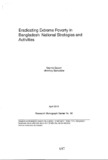| dc.description.abstract | Although Bangladesh has achieved fairly steady economic growth, as of 2011,
almost half of its population still lived in extreme poverty. As a result, the Government
of Bangladesh and its development partners have recently started to target the
extreme poor in many development policies and programmes. As part of a BRAC
Advocacy Unit project titled National Policy Advocacy for CFPR-TUP, this study
maps the current status of national-level policies and programmes that address
extreme poverty in Bangladesh. Research methods include analysis of national
strategies, project evaluations, academic literature, print media, and interviews with
national stakeholders - academics, policymakers, development practitioners, and
journalists. The study found existing poverty classifications as dated, and
overlapping. Mostly linear in nature, these classifications did not represent
categorical sub-groups of the poor. Development actors implemented multiple,
overlapping programmes which often failed to distinguish between short-term social
protection, and longer-term poverty alleviation. Increased dialogue between
stakeholders, sharing organizational experiences, and collaboration on a national
strategy can improve the quality of extreme poverty initiatives in Bangladesh. | en_US |

